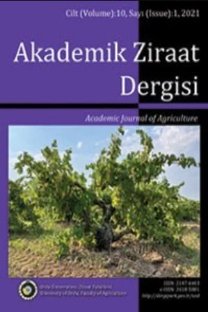Bazı Çevre Dostu Ürünlerin Erysiphe corylacearum'un Neden Olduğu Fındıkta Külleme Hastalığı Üzerindeki Etkinliği
Fındık, Külleme, Mücadele, Çevre dostu ürünler
Effectiveness of Some Environmentally Friendly Products on Hazelnut Powdery Mildew Caused by Erysiphe corylacearum
Hazelnut, Powdery mildew, Control, Environmentally fiendly products,
___
- on powdery mildews of the genus Erysiphe from Azerbaijan. Current Research in Environmental & Applied Mycology, 8(1), 30-53.
- Arzanlou, M., Torbati, M., & Golmohammadi, H. (2018). Powdery mildew on hazelnut (Corylus avellana) caused by Erysiphe corylacearum in Iran. Forest Pathology, 48,e12450. http://dx.doi.org/10.1111/efp.12450
- Beenken, L., Kruse, J., Schmidt, A., & Braun, U. (2022). Epidemic spread of Erysiphe corylacearum in Europe–first records from Germany. Schlechtendalia, 39, 112-118.
- BKÜ Data Base. (2023). Access address https://bku.tarimorman.gov.tr
- Boneva, D.V., Bobev, S.G., & Van Poucke, K. (2023). First report of powdery mildew caused by Erysiphe corylacearum on hazelnut in Bulgaria. Plant Disease. Electronic early view. https://doi.org/10.1094/PDIS-05-23-0840-PDN.
- EPPO, (2021). Erysiphe corylacearum, an emerging pathogen of hazelnut in the EPPO region. EPPO Reporting Service no. 02-2021 Num. article: 2021/042. https://gd.eppo.int/reporting/article-6981
- FAOSTAT, (2022). Crops and livestock products. Food and Agriculture Organization of the United Nations. https://www.fao.org/faostat/en/#data/qcl.
- Gulcu, B. (2022). Field efficacy of trans-Cinnamic Acid against powdery mildew disease, Erysiphe corylacearum, in hazelnut fields. Phytoparasitica, 50(5), 1091-1096.
- Heluta V.P., Makarenko N.V., & Al-Maali G.A., (2019). First records of Erysiphe corylacearum (Erysiphales, Ascomycota) on Corylus avellana in Ukraine. Ukrainian Botanical Journal, 76(3), 252-259.
- Kalmár, K., Desiderio, F., & Varjas, V. (2023). First report of Erysiphe corylacearum causing powdery mildew on hazelnut in Hungary. Plant Disease, 107(2), 579.
- Mazzaglia, A., Drais, M.I., Turco, S., Silvestri, C., Cristofori, V., Aymami, A. Casadó, V., & Rovira, M. (2021). First report of Erysiphe corylacearum causing powdery mildew on Corylus avellana in Spain. New Disease Reports, 44(1), 1-3. https://doi.org/10.1002/ndr2.12035.
- Meparishvili, G., Gur, L., Frenkel, O., Gorgiladze, L., Meparishvili, S., Muradashvili, M., & Jabnidze, R. (2019). First report of powdery mildew caused by Erysiphe corylacearum on hazelnuts in Georgia. Plant Disease, 103(11), 2952.
- Mezzalama, M., Guarnaccia, V., Martano, G., & Spadaro, D. (2021). Presence of powdery mildew caused by Erysiphe corylacearum on hazelnut (Corylus avellana) in Italy. Plant Disease, 105(05), 1565.
- Özsoy, E. (2023). Bazı bitki uçucu yağlarının fındıkta tahripkâr külleme hastalığı etmeni erysiphe corylacearum'a karşı in vitro antifungal etkinliğinin belirlenmesi. Master's thesis, Ordu University, Ordu.
- Rosati, M., Bogoescu, M., & Spadaro, D. (2021). First report of Erysiphe corylacearum, agent of powdery mildew, on hazelnut (Corylus avellana) in Romania. Plant Disease, 105(9), 2728.
- Sezer, A. (2016). Fındıkta külleme. Ünye Ticaret Borsası Dergisi, 2, 42-45.
- Sezer, A., Dolar, F.S., Lucas, S.J, Köse, Ç., & Gümüş, E. (2017) First report of the recently introduced, destructive powdery mildew Erysiphe corylacearum on hazelnut in Turkey. Phytoparasitica, 45, 577-581. https://doi.org/10.1007/s12600-017-0610-1
- Sezer, A., Bilgen, Y., Duyar, Ö., Köse, Ç., Gümüş, E., & Er, T. (2019). Erysiphe corylacearum’un neden olduğu külleme hastalığına karşı Giresun ili fındık üretim alanlarında kimyasal mücadele olanaklarının belirlenmesi. Akademik Ziraat Dergisi, 8(Özel Sayı), 71-78.
- Tanrıvermiş, H., Gönenç, S., & Terzioğlu, S.B. (2006). Türkiye’de fındık üretiminin sosyo-ekonomik yapısı tamamlayıcı gelir kaynaklarını geliştirilebilme olanakları ve etkilerinin değerlendirilmesi. In 3. Milli Fındık Şurası (p. 125-144). Giresun.
- Townsend, G.R., & Heuberger, J.W. (1943) Methods for estimating losses caused by diseases in fungicide experiments. Plant Disease Reporter, 27, 340-343.
- Tuğlu, Ş.Ç., & Coşkuntuna, A. (2019). Sakarya ilinde fındık bahçelerinde külleme hastalığının mücadelesi. H. Demir (Ed.) In II. International Agricultural and Forest Congress Abstract Book (p. 22). İzmir.
- Türkkan, M., Erper İ., Eser Ü., & Baltacı A. (2018). Evaluation of inhibitory effect of some bicarbonate salts and fungicides against hazelnut powdery mildew. Gesunde Pflanzen, 70, 39-44. https://doi.org/10.1007/s10343-017-0411-y
- Yıldırım, İ. (2022). Effects of eco-frıendly treatment programs on powdery mildew (Erysiphe corylacearum Braun & Takam) in hazelnut. The Journal of Animal and Plant Sciences, 32(4), 1018-1027.
- Zajc, J., Rot, M., Snoj, D., Žerjav, M., Schroers, H.-J., Piškur, B., Ogris, N., & Brglez, A. (2023). First report of Erysiphe corylacearum on Corylus avellana and C. colurna in Slovenia. New Disease Reports, 47. e12160. https://doi.org/10.1002/ndr2.12160
- ISSN: 2147-6403
- Yayın Aralığı: Yılda 2 Sayı
- Başlangıç: 2012
- Yayıncı: Ordu Üniversitesi Ziraat Fakültesi
Fındık Küllemesi Hastalığının Kimyasal Mücadelesine Alternatif Uygulamalar
Arzu COŞKUNTUNA, Şehriban ÇELİK TUĞLU
‘Kalınkara’ Fındık Çeşidinde Çotanak Dökümü
Tombul Fındıkta Rehabilitasyon Uygulamalarının Verim ve Kaliteye Etkileri
Hüseyin Eren KORKMAZ, Mehmet AKGÜN, Mutlu SÖNMEZ ÇELEBİ, Kürşat KORKMAZ
Xenon Test Cihazıyla Işığa Maruz Bırakılan β-Karoten Takviyeli Fındık Yağının Oksidasyon Kararlılığı
Banu Demirel ATEŞ, Fikri BALTA
Mehmet Fikret BALTA, Bilal SAYAR, Orhan KARAKAYA, Tuncay KAYA, Hüseyın KIRKAYA
Fatsa (Ordu)'da Yetiştirilen 'Karafındık' Fındık Klonlarının Verim Özellikleri ve Meyve Kusurları
Serkan UZUN, Fikri BALTA, Orhan KARAKAYA, M. Fikret BALTA
Ordu-Kumru Yöresi Fındık Bahçelerinin Toprak Verimlilik Durumlarının Belirlenmesi
